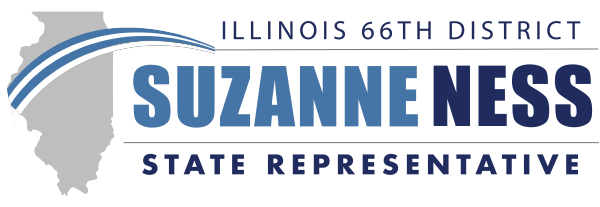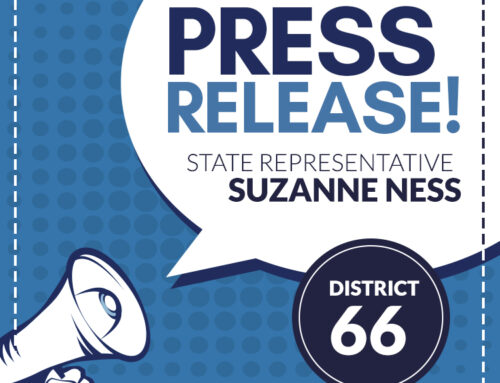On Friday, April 7th 2022 the Illinois General Assembly passed the State Budget for 2022-2023.
Below, please see an overview of the Budget. Questions? Send us a message at info@repsnessil66.com or call us at (224)-484-8620.

Financial Relief
To begin with, we are fully funding the Governor’s $1B Illinois Family Relief Plan, which includes:
• Suspending the grocery tax for a year-saving consumers $400 million
• Freezing the gas tax for 6 months-saving consumers $70 million
• Doubling the property tax rebate to save up to $300 per household
While this proposal is a great start, we felt additions were necessary to round out the budget.
• We have proposed permanently expanding the Earned Income Tax Credit in Illinois by adding 2% to the federal level. It will now cover people ages 18-25 and 65+, and ITIN filers are now included with refundable credit. This extremely effective program provides funding for low-income Illinoisans, and, by including ITIN filers, we are making sure it includes immigrants.
• To give essential assistance to low-income parents as they manage the pressures of inflation and other challenges, we are giving eligible tax filers one-time direct checks for $50 and $100 for each of their children.
• To further combat inflation, we permanently increased funding for local governments. While families face inflation, municipalities can use these funds to provide their own insulation.
• Finally, we will also be doubling the tax credit for teachers purchasing classroom materials. There will also be a sales tax holiday on school supplies for all consumers. Investments in Illinois kids are investments in the future, and the hard-working educators in our schools need support.
Education
PreK-12 and Special Education
• We are fully funding Governor Pritzker’s $350M increase for evidenced-based education funding. Teaching our children well—regardless of their socioeconomic background—is key towards providing them with the opportunities they need to uplift their communities and live happy, healthy lives.
• Special education is a critical aspect of our schools that gets overlooked far too often. Special education grants will receive a $96M increase for critical new services, such as more training for special education teachers so they can provide the care and attention these children deserve.
• We are giving Illinois schools an extra $54.4M for early childhood education programs to jumpstart our kids’ education and provide childcare assistance to Illinois parents.
• The tax credit teachers receive for classroom materials will double, because education is key to our state’s growth. Investments in Illinois kids are investments in the future, but the hard-working teachers in our communities should not be paying for those investments out of their own pockets.
Higher Education
• A $122M increase in Monetary Award Program (MAP) funding will bolster financial aid for low-income students who want to go to college—more than 50% higher than MAP funding 4 years ago. Democrats are committed to creating opportunities in underserved communities, and MAP grants help uplift kids who are encumbered by their financial circumstances.
• $68M in funding—a 5% increase—to universities and community colleges will help create new higher education opportunities for Illinois next class of high school graduates.
• We are expanding funding for minority teacher scholarships by $2.3M so the diversity of our teachers more closely reflects the diversity of our state.
• An additional $525,000 is going to the Diversifying Higher Education Faculty in Illinois, so colleges and universities are open to a wider range of communities.
Healthcare
• $180M will be allocated to reinvest in the Healthcare Workforce Initiative to continue to train and grow Illinois’ healthcare workforce, with a focus on Medicaid providers in underserved areas.
• We set aside $450M towards Healthcare Transformation Collaborative to prioritize community-driven collaborations assisting safety-net and critical access hospitals in delivering care in underserved communities. These collaboratives directly address community needs for all levels of health, with an emphasis on social and structural determinants. Their direct contact with communities allows them to tailor healthcare to specific needs of an area which often get overlooked by larger providers.
• $20M will go to public health preparedness measures—in addition to $2B in federal funding already set aside. If another pandemic or major health hazard should come up, we have to be prepared.
Human Services & Housing
• The Pathways to Success Program for children under 21 with serious mental illnesses will be fully funded at $150M. Pathways to Success focused on crafting detailed plans for children with complex problems. These kids should not have to wait until a crisis to get a high level of personal attention.
• We are setting $275M aside in ARPA funding for the Illinois House Development Authority to provide grants, forgivable loans and other expenses associated with affordable housing development programs. We cannot overlook the many Illinoisans who are still recovering for housing-insecurity as a result of the COVID-19 pandemic.
• $130M is going towards legal assistance for those under threat of eviction as a result of COVID-19.
• A $16M increase in funding for the Parents Too Soon—now $10.4M—and Healthy Families—now $10.05M—programs will go to providing home visiting, doula, and nutritional guidance for new and low-income mothers. A family’s income status should not force them into lower quality healthcare for their babies.
• $3.58B will go to Illinois’ Child Care Assistance Program, a $19.4M increase from last year. Illinois kids deserve the best care we can give them, so we’re lending a hand to single parents who can’t be there every hour of the day.
• In addition to the $550M already proposed by the Governor, $105M is apportioned to give the dedicated men and women in our nursing home system more resources to help provide the highest quality care for Illinois’ seniors. The money will be spent on higher wages for nursing assistants as well as incentives for nursing homes to hire and retain direct care staff.
• We dedicated $150 million to build thousands of new affordable housing apartments across the state given rising rents are putting pressure on families.
Environment
• We are allocating $113M of the federal Infrastructure Investment and Jobs Act to replace lead service lines. It is past time that we eliminate the public health hazard that lead pipes pose. Ridding our state of lead lines is also essential from an equity perspective. These pipes disproportionately affect underserved communities, and people should not be forced to live with this threat simply because of where they were born.
• $195M for the Illinois Green Infrastructure Grant Opportunities Program and Unsewered Communities Construction Grant Program will go to much-needed upkeep and modernization of water quality and storm water management services.
• $56M will go to Open Space Lands Acquisition and Development grants, which fund community park projects. Illinoisans deserve opportunities to freely enjoy the natural world, and parks offer that chance.
Immigration and Refugees
• Illinoisans will continue to shape our policy to provide a safe haven for all immigrants.
• We further expanded coverage for undocumented immigrants under the state’s Medicaid paid, allowing ages 42-54.
• A major step in economic equity is the fact that we now include ITIN tax filers in Earned Income Tax Credit eligibility.
• Illinois will open its doors to all Ukrainian refugees who are looking for a home following the brutal and unprovoked attacks by Vladimir Putin.
Public Safety
• In addition to public safety funding in the Governor’s budget, including the $250 million for the Reimagine Public Safety Act, we are adding more than $200 million more for public safety.
• $124 million of this will go to support local police and reduce violent crime.
– This includes funding for body cameras, automatic license plate readers, ballistics testing and forensics, and non-lethal equipment to subdue suspects with less risk to life.
– This also includes funding for mental health screenings for local police departments, funding for a co-responder pilot program, and law enforcement retention grants.
• $48 million is allotted to prevent carjacking – with funding for local safety councils, youth summer jobs programs, YouthBuild Illinois, Teen REACH, Youth Redeploy Illinois, Parents Too Soon, and Comprehensive Community-Based Youth Services.
• $12 million would fund programs to help neighbors actively assist in reporting crimes. This will include money for witness protection, a tip line and a pilot program to use ring cameras to help solve crime.
• $70 million will go towards domestic violence prevention.
• $2 million will go towards expanding trauma recovery centers.
• We must continue to immediately address the safety concerns facing families and businesses. And we must continue to work with stakeholders on a long-term, comprehensive, well-funded plan to address the root causes of violence.
• That’s what this proposed funding is dedicated to. The smart-on-crime package the House passed this session that will make our communities safer, support law enforcement, and help crime victims receive the care they deserve.
Pensions and Fiscal Responsibility
• $9.6B will go to fully funding our pension obligations for fiscal year 2023. Countless Illinoisans worked for years to earn their pensions, and we must honor the commitment we made to them in return.
• We are paying down $4B in unpaid bills which includes:
– All COVID-19-related borrowing
– $900M in delayed health insurance bills
– $500M in pension stabilization
– Late payment interest
• We’re infusing $1B into the once-depleted Rainy Day Fund
• The fiscally-responsible steps we are taking will continue to raise Illinois’ credit rating and improve our financial forecast, as they have done so far.
• These steps will also save on future interest payments that otherwise would continue to eat into our budget. We will be able to spend that extra money on essential services for the people of Illinois.
DCEO and Agriculture
• $70M in new federal funding is allocated to support the Food and Farm Worker Relief Grant Program.
• $75M will go to the Hotel Jobs Recovery Grant Program to continue to rehire workers who lost their positions as a result of the COVID-19 pandemic.
• $50M in new ARPA (American Rescue Plan Act) funding will go to award grants to independent live venue operators, performing arts organizations, arts education organizations, and museums, who lost business as a result of COVID-19 interruptions.

